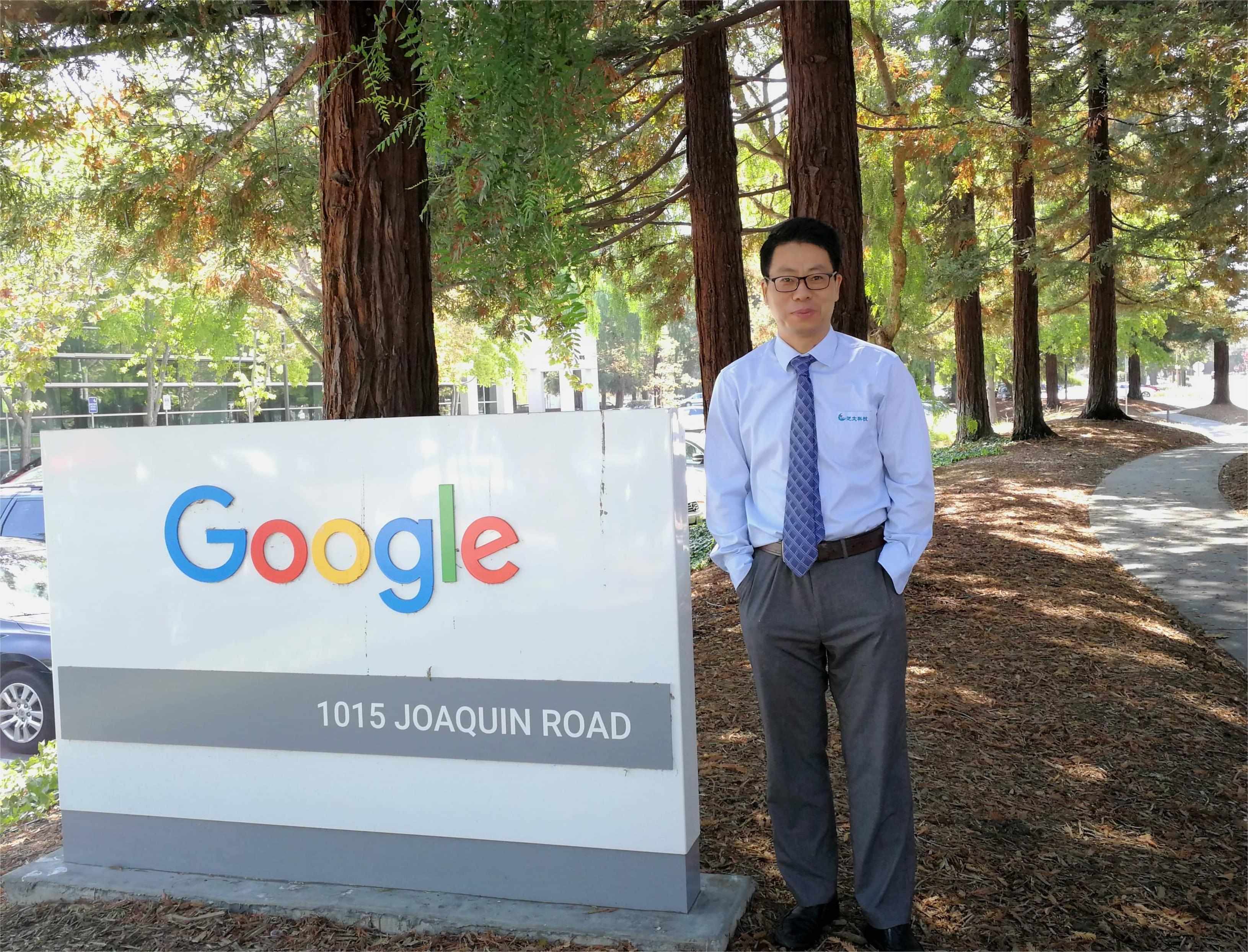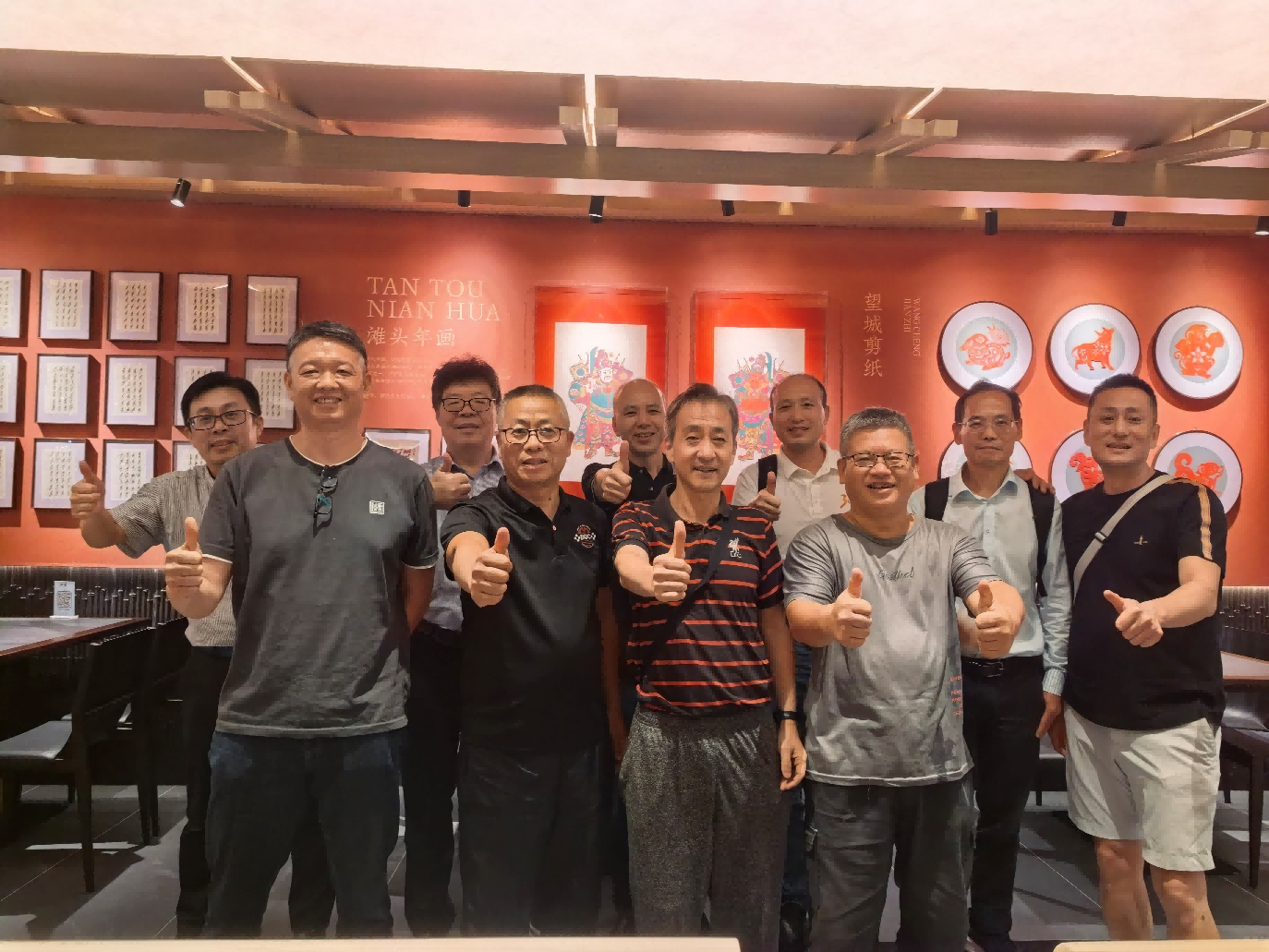泛太科技楊恒博士:揚帆出海正當時
2025年5月下旬無錫泛太科技有限公司董事長、新加坡南洋理工大學校友、香港科技大學校友、西北工業(yè)大學無錫校友會副會長楊恒博士應約訪問了泰國曼谷、新加坡等地。在曼谷期間,楊博士和泰國AI高教、職業(yè)教育合作方進行了深入探討,并介紹了泛太出海 AI教育從實驗室、師資培養(yǎng)和校企合作Total Solution,獲得合作方好評。
圖 1 楊恒博士在美國硅谷參加國際會議
5月20日傍晚6點,楊恒博士與新加坡共和理工學院的姜力軍教授、國立大學吳達軍博士、華科大倉儲總裁陶明及西北工業(yè)大學新加坡校友會王永杰、強大勇、徐磊、陳國超、李寧和吳小偉等一批教授專家在武吉士的麥當勞會晤。
圖2 在新加坡武吉士麥當勞會晤
楊恒博士作為“海外科技領軍人才”和一批志同道合合作伙伴回國創(chuàng)辦了無錫泛太科技有限公司。公司成立于2009年,坐落于中國物聯(lián)網之都無錫新區(qū),擁有一批留英、留美歸國博士團隊。泛太科技擁有包括發(fā)明專利、實用新穎專利以及計算機軟件著作權在內的中國完全自主知識產權百余項。近年來與國內500余所院校合作共建了多門類的實驗/實訓室、實驗/實訓中心以及實踐/實訓基地,合作院校類別涵蓋本科、高職、中職、技工技師以及普教學校,教培產品與服務受眾已超過50萬人。公司和清華大學共同獲科技創(chuàng)新一等獎,也成功進入華為等一批上市公司頭部企業(yè)供應商體系。
近年來,全球AI賽道逐漸呈現(xiàn)中美爭霸格局,中國AI、工業(yè)互聯(lián)網、無人駕駛智能座艙、無人工廠、智慧高鐵及智慧礦山等前沿技術不斷獲得海外關注。中國科技產業(yè)及教育產品具有物美價廉優(yōu)勢深受海外客戶歡迎,楊恒博士此次東南亞行的一個主要目的就是與當?shù)亟涗N商探討與各海外大專院校合作開辦AI專業(yè)課程設置。
無錫泛太科技在AI方面產品、教育與產業(yè)應用,立即引起了在場教授專家們的濃厚興趣和熱烈討論。為使方便交流,大家移步到附近的湘聚餐館,一邊聚餐,一邊進一步交流。
第二天早上,楊恒還就相關話題與其他朋友繼續(xù)探討,詳細闡述泛太主打產品、企業(yè)運行模式和出海目標及愿景。
在新的一波AI教育浪潮下,南洋理工大學和新加坡國立大學一批博士專家支撐下,新加坡合作方和泛太科技正在推出新加坡兒童AI學習品牌。歡迎國內外感興趣朋友加盟合作。
圖3 新加坡湘聚餐廳大家共同祝賀“泛太科技 乘風破浪 出海成功”
此次出訪是一次有關AI交流、學習和具體應用的有意義碰撞。最后,預祝無錫泛太科技出海乘風破浪!直掛云帆濟滄海!(全文完)
(感謝西北工業(yè)大學 新加坡校友會提供部分內容和圖片)
附件 1. 泛太科技針對海外市場主打產品
產品1 第二代鴻蒙智能座艙實訓車

第二代鴻蒙智能座艙實訓車(SeaIOT-CAR-05)是一款基于鴻蒙操作系統(tǒng)定制開發(fā)的智能座艙實驗實訓系統(tǒng),該系統(tǒng)模擬智能網聯(lián)汽車大腦,是云計算、大數(shù)據(jù)、人工智能、智聯(lián)網、自動駕駛、國產鴻蒙系統(tǒng)等新一代信息技術在智能網聯(lián)汽車教育領域的創(chuàng)新應用成果,整個智能座艙由一部純電動汽車改裝而成。包括智能駕駛實訓系統(tǒng)、鴻蒙智能座艙實訓系統(tǒng)、路況模擬虛擬仿真系統(tǒng)和線控底盤數(shù)據(jù)采集系統(tǒng)4大部分組成。第二代鴻蒙智能座艙實訓車既可進行實驗實訓,也支持開展二次開發(fā),更可完成無人駕駛,是本科人工智能、電子信息工程、車輛工程、自動化以及計算機科學與技術專業(yè),高職高專智能網聯(lián)汽車技術、汽車電子技術、汽車檢測與維修技術、新能源汽車技術、智能交通技術運用、汽車運用與維修技術等專業(yè)。
http://m.leptonchat.cn/products/podetail/492.html
產品2 C2M2B黑燈工廠智能生產線
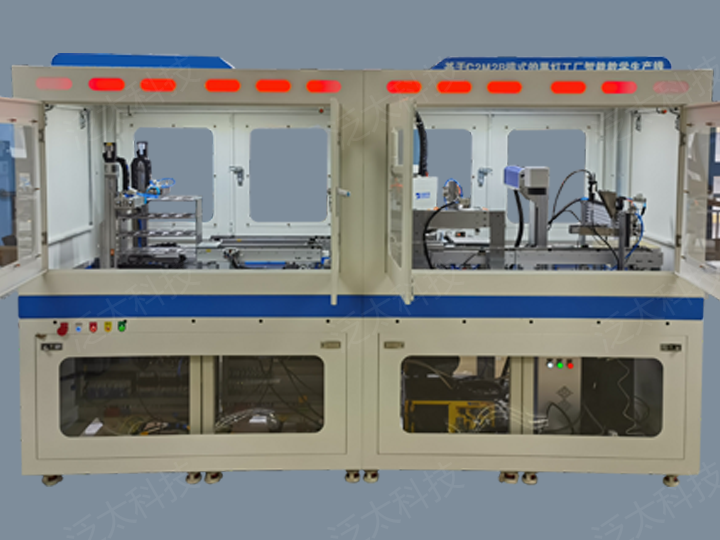
C2M2B黑燈工廠智能生產線(SeaIOT-EA-DF04-01),是一款以AI、工業(yè)互聯(lián)網和電氣自動化為核心技術的全流程無人值守、甚至無需照明的訂單式名片夾裝配產線。將工廠產線簡化搬進課堂,讓學生在課堂上就能學習智能產線的各項技術,與工廠無縫銜接,縮短學生與行業(yè)的距離。
產線由原料碼垛、移載輸送、機器人裝配、雕刻檢測共4個工位、以及安全操作罩殼拼裝組合形成,結合邊緣服務器、工業(yè)互聯(lián)網融合平臺,通過工業(yè)網絡通信技術,用戶直接使用微信小程序或移動端APP下單觸發(fā)生產,實現(xiàn)名片夾上下蓋的自動取料、移載輸送、機器人自動取針、裝針、頂針、合蓋、壓緊、中英文字符激光雕刻、名片夾表面劃痕瑕疵檢測、合格品及殘次品自動分揀等功能,平臺能夠實時展示原材料庫存狀態(tài)、設備運行狀態(tài)、當前及歷史工單情況、視覺采集圖片與檢測結果、產線能量消耗等信息。
課程方面,提供了豐富的實驗資源和應用開發(fā)案例,支持職業(yè)技能大賽,具有協(xié)同分組實驗實訓、科研開發(fā)及應用創(chuàng)新的能力。
http://m.leptonchat.cn/products/podetail/488.html
產品3 鴻蒙軌道交通應用場景模型設備
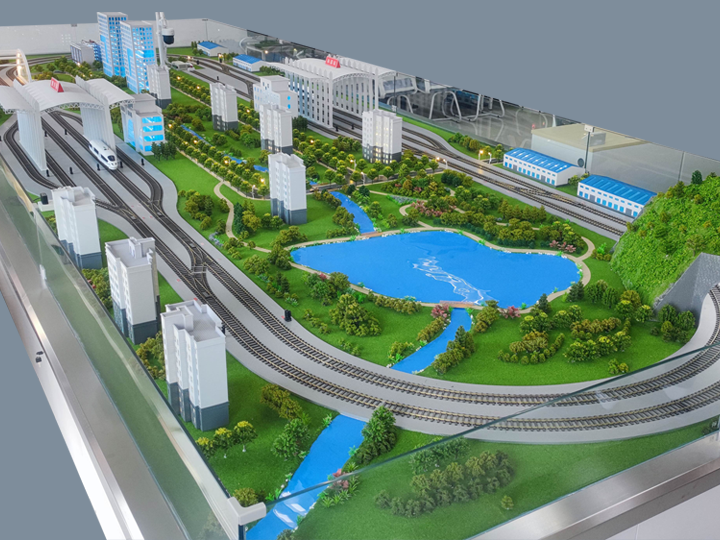
鴻蒙軌道交通應用場景模型設備(型號:SeaIOT-PMST-02),包括軌道交通智能沙盤實訓系統(tǒng)、機車控制系統(tǒng)、微機聯(lián)鎖系統(tǒng)、CTC車站系統(tǒng)、CTC調度室系統(tǒng)、智慧軌道軟件模塊以及配套的課程資源。整套設備模擬真實軌道交通運營環(huán)境,實現(xiàn)列車自動控制、列車調度、乘客信息以及智能監(jiān)控與預警管理等,以及再現(xiàn)智慧軌道交通中的交通流量管理、路徑優(yōu)化、自動駕駛車輛調度等應用場景模擬,搭建軌道交通控制和調度的仿真教學科研平臺。
http://m.leptonchat.cn/products/podetail/490.html
產品4 物聯(lián)網技術開發(fā)平臺

物聯(lián)網技術開發(fā)平臺(型號:SeaIOT-FTable-02)是一款基礎教學實驗開發(fā)平臺,由1個通用平臺,多個系列硬件模塊,上位機軟件及教學資源三部分組成,主要針對物聯(lián)網、電子信息、計算機等專業(yè)的單片機與傳感器、嵌入式接口技術、識別技術、無線通信技術、智能產品、人工智能等課程的教學實驗。
SeaIOT-FTable-1A型增加了鴻蒙開發(fā)模塊。
平臺結構符合人體工學設計,由分離式基座和網板組成。硬件模塊采用磁吸方式與基座連接固定,接觸式探針進行供電和信號傳輸,使用方便,不易損壞管腳,易于拓展。場景引入式教學模式和豐富的教學資源,既可以支撐單個模塊單一知識點的學習,也支持多個模塊自由組合進行多個知識點的綜合應用。
http://m.leptonchat.cn/products/podetail/317.html
產品5 無線傳感網全功能實驗箱
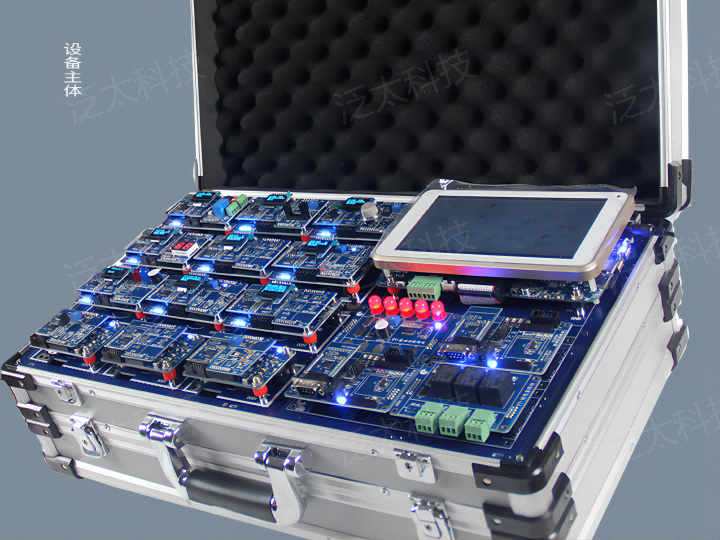
SeaIOT-B-WSN-2A型無線傳感網全功能實驗箱是SeaIOT-B-WSN-02型的升級版,集成Bluetooth、WiFi、IEEE802.15.4、ZigBee等短距離無線通信技術,將6LowPAN(IPv6)互聯(lián)網協(xié)議應用到短距離無線通信網絡中,與ZigBee使用的ZStack協(xié)議棧并存,支持雙協(xié)議棧;集成LoRa、NB-IoT等長距離無線通信技術,自定義傳感網協(xié)議,CoAP應用協(xié)議,實現(xiàn)主從機組網應用,平臺接入應用。采用三星Cortex-A9 S5P4418四核處理器作為智能網關,支持6LowPAN、Z-Stack、自定義傳感網協(xié)議等多協(xié)議解析,具有1GB內存、8GB大容量存儲空間、7寸電容觸摸顯示屏、豐富的外圍接口,可板載GPS定位、WIFI/BT二合一通訊、4G移動通訊等多種模塊,內嵌Android、Linux雙系統(tǒng),可一鍵切換。
系統(tǒng)提供豐富的實驗例程、實驗手冊、教學視頻等課程資源,能夠滿足嵌入式接口技術、無線通信技術、無線傳感器網絡、嵌入式系統(tǒng)應用開發(fā)、Android移動互聯(lián)網應用開發(fā)等課程的教學與實踐。
http://m.leptonchat.cn/products/podetail/318.html
產品6 5G人工智能實驗箱
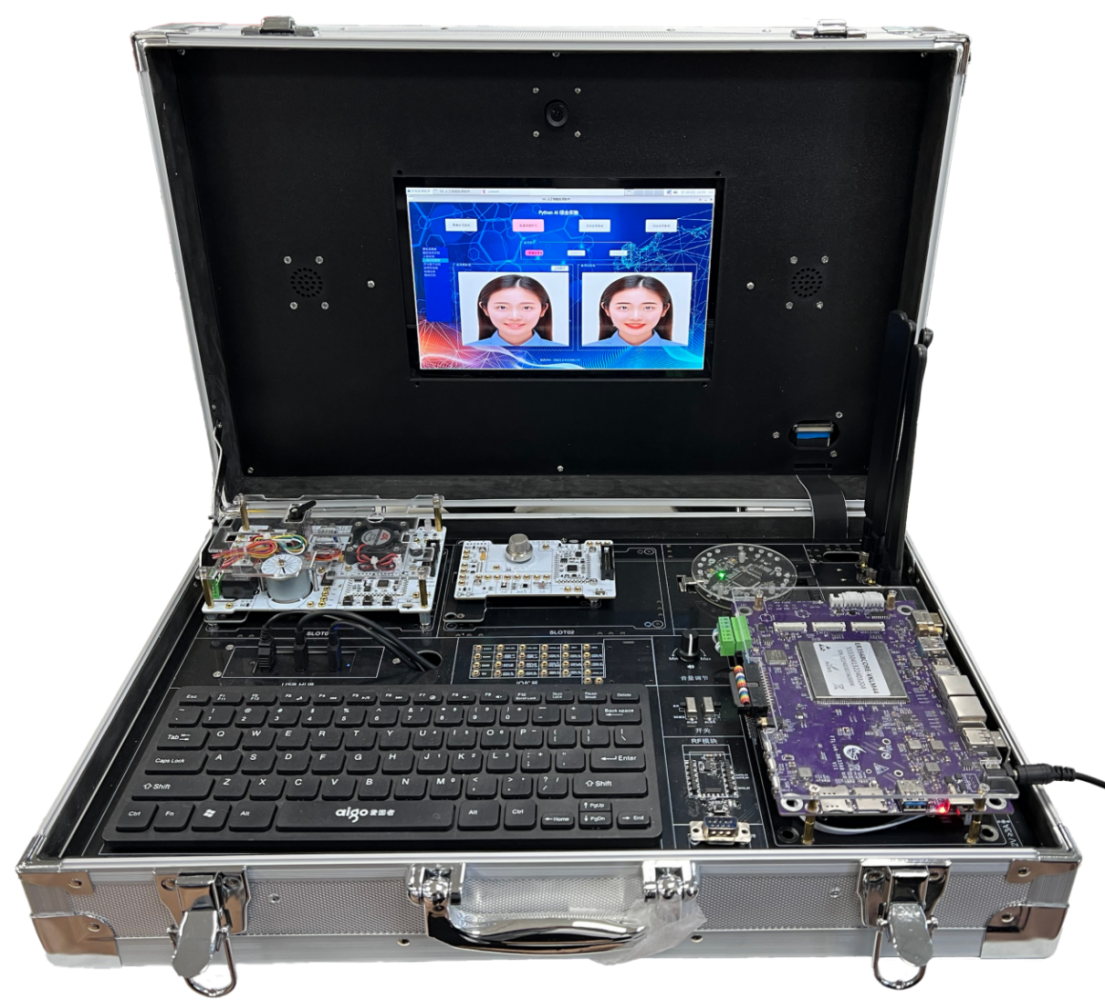
5G人工智能實驗箱(型號:SeaIOT-B-5GEDK-01),是一款綜合5G通信、邊緣計算、視覺識別、語音識別、物聯(lián)網技術、Python應用開發(fā)的實驗教學產品。
產品采用高性能AI處理器,內嵌機器視覺庫和深度學習框架,外圍連接攝像頭、麥克風陣列進行圖像、語音信號的采集、分析、識別、決策;引出處理器外設接口用于應用擴展;板載物聯(lián)網傳感器和傳感網模塊,支持通過有線、或無線方式與AI系統(tǒng)進行通信;融合5G移動通信,可將數(shù)據(jù)、圖像、視頻等多媒體數(shù)據(jù)及結構化數(shù)據(jù)推送到云服務平臺;提供5G云端接入、視頻流實時推送、圖像處理基礎、機器學習、深度學習、語音識別、數(shù)據(jù)預測、以及與物聯(lián)網模塊結合開展綜合應用的案例。
http://m.leptonchat.cn/products/podetail/305.html
產品7 人工智能物聯(lián)網實驗箱

人工智能物聯(lián)網實驗箱(型號:SeaIOT-B-AIOT-01),是一款綜合人工智能物聯(lián)網技術綜合應用、5G通信、邊緣計算、視覺識別、語音識別、Python應用開發(fā)的實驗教學產品。
產品采用高性能AI處理器,內嵌機器視覺庫和深度學習框架,板載攝像頭、麥克風陣列進行圖像、語音信號的采集、分析、識別、決策;引出處理器外設接口用于應用擴展;板載物聯(lián)網傳感器和傳感網模塊,支持通過有線、或無線方式與AI系統(tǒng)進行通信;融合5G移動通信,可將數(shù)據(jù)、圖像、視頻等多媒體數(shù)據(jù)及結構化數(shù)據(jù)推送到云服務平臺;提供5G云端接入、視頻流 實時推送、圖像處理基礎、機器學習、深度學習、語音識別、數(shù)據(jù)預測、以及與物聯(lián)網模塊結合開展綜合應用的案例。
http://m.leptonchat.cn/products/podetail/473.html
附件 2. 泛太科技針對海外市場的AI 應用型本科教育解決方案
Teaching, Experiment and Graduation Project Plan for the Four-year Undergraduate Program in Artificial Intelligence and Information Technology International(Based on total solution of Fantai. Tech.)
1.1 Freshman Year Courses and Practice Plan
1.1.1 First Semester
·
Course Offerings: "Advanced Mathematics", "University Physics", "Introduction to Computer Basics and Programming". "Advanced Mathematics" and "University Physics" provide the mathematical and physical foundation for subsequent professional courses. "Introduction to Computer Basics and Programming" teaches basic computer principles, basic Python programming syntax, data types, control structures, etc., enabling students to get an initial exposure to programming and laying the foundation for in - depth learning of programming languages and development technologies.
·
Experiment Arrangements: Relying on the 5G artificial intelligence experiment box, conduct Python basic programming experiments, such as simple numerical calculations, string processing, conditional judgment, and loop structure applications. With the help of the basic development platform for electronics and computer - related majors, carry out basic circuit cognition experiments to familiarize students with the basic structure of the experiment box, circuit connection methods, and the use of common instruments and meters.
·
Teaching Objectives: Enable students to understand the importance of basic subject knowledge in the major, master basic Python programming skills and basic circuit experiment operations, cultivate students' logical thinking and hands - on practical ability, and stimulate students' interest in learning professional courses.
1.1.2 Second Semester
·
Course Offerings: "Discrete Mathematics", "Digital Electronic Technology", "Advanced Python Programming". "Discrete Mathematics" teaches knowledge such as set theory, mathematical logic, and graph theory, providing theoretical support for artificial intelligence algorithm design. "Digital Electronic Technology" explains digital logic basics, combinational logic circuits, and sequential logic circuits, enabling students to understand the basic principles and design methods of digital circuits. "Advanced Python Programming" delves into Python functions, modules, file operations, object - oriented programming, etc., to improve students' programming ability.
·
Experiment Arrangements: Conduct digital circuit experiments on the basic development platform for electronics and computer - related majors, such as function testing and circuit design of digital chips like counters and decoders. Use the 5G artificial intelligence experiment box to carry out advanced Python programming experiments, such as developing simple command - line tools and file management programs.
·
Teaching Objectives: Enable students to master the basic concepts and principles of discrete mathematics and digital electronic technology, proficiently use Python for more complex program development, improve students' logical thinking and circuit design capabilities, and cultivate students' programming thinking for solving practical problems.
1.2 Sophomore Year Courses and Practice Plan
1.2.1 First Semester
·
Course Offerings: "Data Structure", "Algorithm Analysis and Design", "Introduction to Artificial Intelligence". "Data Structure" teaches data structures such as linear lists, stacks, queues, trees, and graphs, as well as their storage and operation methods, providing a data organization basis for algorithm implementation. "Algorithm Analysis and Design" explains common algorithm design strategies and algorithm complexity analysis methods, cultivating students' ability to design efficient algorithms. "Introduction to Artificial Intelligence" introduces the development history, basic concepts, main research fields, and application scenarios of artificial intelligence, giving students a comprehensive understanding of artificial intelligence.
·
Experiment Arrangements: Based on the basic development platform for electronics and computer - related majors and the 5G artificial intelligence experiment box, conduct data structure and algorithm verification experiments, such as implementing the basic operations of linked lists and binary trees, and performance testing of sorting and searching algorithms. Carry out simple artificial intelligence algorithm experiments, such as building rule - based expert systems.
·
Teaching Objectives: Enable students to master the core knowledge of data structures and algorithms, understand the basic principles and applications of artificial intelligence, be able to use the learned knowledge for simple algorithm implementation and artificial intelligence system construction, and improve students' algorithm design and practical ability.
1.2.2 Second Semester
·
Course Offerings: "Machine Learning", "Computer Networks", "Database Principles and Applications". "Machine Learning" deeply explains machine learning algorithms such as supervised learning, unsupervised learning, and semi - supervised learning, including the principles and applications of models such as linear regression, decision trees, and neural networks. "Computer Networks" introduces the computer network architecture, protocols, and network communication principles, enabling students to understand the network data transmission and communication mechanisms. "Database Principles and Applications" teaches the basic concepts of database systems, relational database design, and SQL language, cultivating students' database design and operation capabilities.
·
Experiment Arrangements: Use the 5G artificial intelligence experiment box to carry out machine learning algorithm experiments, such as using the iris dataset for classification algorithm experiments and building a simple neural network using the TensorFlow framework for handwritten digit recognition. Conduct computer network experiments on the basic development platform for electronics and computer - related majors, such as network topology construction, IP address configuration, and network communication testing. Conduct database experiments, such as designing and implementing a small - scale database management system.
·
Teaching Objectives: Enable students to proficiently master machine learning algorithms and applications, understand the principles of computer networks and databases, have the ability to use machine learning algorithms to solve practical problems, design and manage databases, and improve students' practical skills in the cross - field of artificial intelligence and information technology.
1.3 Junior Year Courses and Practice Plan
1.3.1 First Semester
·
Course Offerings: "Deep Learning", "Machine Vision", "Natural Language Processing". "Deep Learning" deeply studies the structure, training methods, and optimization strategies of deep neural networks, such as convolutional neural networks (CNNs), recurrent neural networks (RNNs), and their variants. "Machine Vision" introduces the composition of machine vision systems, image processing algorithms, object detection and recognition technologies, cultivating students' ability to use machine vision technology to solve practical problems. "Natural Language Processing" explains the basic tasks, models, and algorithms of natural language processing, such as text classification, sentiment analysis, and machine translation, enabling students to understand how to make computers understand and process human language.
·
Experiment Arrangements: Based on the 5G artificial intelligence experiment box, carry out deep learning experiments, such as using CNNs for image classification and object detection, and using RNNs for text generation. Conduct machine vision experiments, such as industrial product appearance defect detection and face recognition access control system design. Carry out natural language processing experiments, such as news text classification and simple question - answering system development.
·
Teaching Objectives: Enable students to master the core technologies of deep learning, machine vision, and natural language processing, be able to use relevant technologies to develop intelligent application systems, and improve students' practical and innovative abilities in the cutting - edge fields of artificial intelligence.
1.3.2 Second Semester
·
Course Offerings: "Internet of Things Technology and Applications", "Intelligent Computing Technology", "Principles of Big Data Technology". "Internet of Things Technology and Applications" introduces the architecture, key technologies, and application scenarios of the Internet of Things, including sensor technology, wireless communication technology, Internet of Things platforms, etc., cultivating students' ability to design and develop Internet of Things systems. "Intelligent Computing Technology" explains intelligent computing methods such as genetic algorithms and particle swarm optimization algorithms and their applications in optimization problems, expanding students' thinking for solving complex problems. "Principles of Big Data Technology" teaches the basic technologies of big data collection, storage, processing, and analysis, such as the Hadoop and Spark frameworks, enabling students to understand the big data processing process and technical architecture.
·
Experiment Arrangements: Combine the basic development platform for electronics and computer - related majors and the 5G artificial intelligence experiment box to conduct Internet of Things comprehensive experiments, such as smart home system construction and smart agricultural environment monitoring system development. Carry out intelligent computing algorithm experiments, such as using genetic algorithms to solve function optimization problems. Conduct big data technology experiments, such as using Hadoop for large - scale data storage and processing and using Spark for data analysis and mining.
·
Teaching Objectives: Enable students to master the basic principles and applications of the Internet of Things, intelligent computing, and big data technologies, be able to comprehensively use multiple technologies to solve practical problems, and improve students' cross - field technology application and system development capabilities.
1.4 Senior Year Courses and Practice Plan
1.4.1 First Semester
·
Course Offerings: "Professional Comprehensive Course Design". Oriented by project practice, comprehensively apply the previously learned professional knowledge. Students work in groups to choose comprehensive projects, such as the development of intelligent security monitoring systems and the design of intelligent logistics management systems, covering artificial intelligence algorithms, information technology applications, system integration, and other aspects.
·
Experiment Arrangements: Under the guidance of teachers, students use two experimental platforms to complete project requirements analysis, system design, code writing, system testing, and optimization. During the project implementation process, cultivate students' teamwork, project management, and comprehensive technology application capabilities.
·
Teaching Objectives: Through the professional comprehensive course design, improve students' ability to comprehensively use professional knowledge to solve practical problems, cultivate students' teamwork spirit and project management capabilities, and lay a foundation for graduation projects and future career development.
1.4.2 Second Semester
·
Course Offerings: "Graduation Project". Students determine their graduation project topics according to their interests and professional directions and conduct in - depth research and development. The topics can be sourced from teachers' scientific research projects, actual enterprise needs, or students' independent innovative ideas, such as artificial - intelligence - based medical image diagnosis assistance systems and big - data - based personalized recommendation systems.
·
Experiment Arrangements: Students independently complete the graduation project, including project research, scheme design, technology selection, system development, experimental verification, and thesis writing. Teachers provide regular guidance, check the progress and quality of students' graduation projects, and help students solve problems encountered.
·
Teaching Objectives: Through the graduation project, cultivate students' independent thinking, innovative practice, and scientific research abilities, enable students to have the ability to comprehensively use the learned knowledge to solve complex engineering problems, and meet the professional level and comprehensive quality requirements of undergraduate graduates.
1.5 Graduation Project Topic Directions
1. Deep - Learning - Based Intelligent Medical Image Diagnosis System: Use deep learning algorithms to analyze medical images (such as X - rays, CTs, MRIs, etc.) to achieve automatic disease disease diagnosis and auxiliary decision - making, improving the accuracy and efficiency of medical diagnosis.
2. Intelligent Environmental Monitoring System Based on the Internet of Things and Artificial Intelligence: Combine Internet of Things sensor technology to collect environmental data (such as air quality, water quality, noise, etc.), and use artificial intelligence algorithms for data analysis and prediction to achieve real - time environmental monitoring and intelligent management, providing support for environmental protection decision - making.
3. Natural - Language - Processing - Based Intelligent Customer Service System: Adopt natural language processing technology to implement an intelligent customer service system that can automatically understand user questions and provide accurate answers, improving customer service efficiency and quality. It can be applied in many fields such as e - commerce and finance.
4. Big - Data - and Machine - Learning - Based Personalized Education Recommendation Platform: Collect and analyze students' learning data, use machine learning algorithms to build personalized learning models, provide students with customized learning resources and learning path recommendations, achieve personalized education, and improve learning effects.
